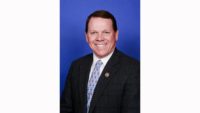The House Appropriations Committee has approved a $25.4-billion appropriations bill for fiscal year 2024 that cuts funding across a wide swath of federal programs within the Dept. of the Interior and U.S. Environmental Protection Agency, including state and tribal assistance grants for water and wastewater infrastructure as well as the Superfund cleanup program.
The committee approved the measure July 19 by a party-line 33-27 vote.
The bill reduces appropriations for EPA by $3.96 billion, a 39% cut. It slashes state and tribal assistance programs, which include the water and wastewater state revolving fund loan program, by 42% below fiscal 2023 enacted levels, and cuts funding for Superfund 72% below fiscal 2023 enacted levels. The committee-passed bill also rescinds several climate and social justice-related provisions of the Inflation Reduction Act, including $7.8 billion from the newly created Greenhouse Gas Reduction Fund, $1.4 billion for environmental and climate funding, and $55 million from the White House Council on Environmental Quality.
The bill also includes a provision that would repeal the Biden administration’s rule governing how to identify and protect Waters of the United States (WOTUS) under the Clean Water Act.
A few programs were spared the budget axe, including funding to protect the Chesapeake Bay and a new pilot program to encourage water reuse projects. Already-appropriated funding under the Infrastructure Investment and Jobs Act also remains intact.
Long Road Ahead
While the spending cuts are largely an outgrowth of the priorities of the Republican-led House, political observers note that the passage of the bill out of the House Committee is just the first step in a process that will likely take months, and that the Democratic-controlled Senate is likely to introduce a very different bill. “This is the opening bid,” from the GOP-led House, says Jimmy Christianson, vice president of government affairs at the Associated General Contractors of America.
Sen. Patti Murray (D-Wash.), chair of the Senate Appropriations Committee, has said her committee plans to release a draft bill next week, and a markup is scheduled for July 27.
Still, water and construction groups are reeling from the cuts in the House bill. “We knew the House numbers were going to be low, but I would say this is worse than what anybody expected,” says Kristina Surfus, managing director of the National Association of Clean Water Agencies. “We’re feeling a little more optimistic as we look at the Senate. But it’s not going to be great,” she adds.
One driver of the reductions is the Debt Reduction Act enacted this year, which seeks to trim government spending across the board, Surfus notes. “Because of the spending cap, the numbers are going to be a lot less than what we need.” Wastewater utilities could be left scrambling to fund already planned projects because they’ve been moving forward under the assumption that the money would be there, she says.
Doug Carlson, CEO of the National Utility Contractors Association, said in a statement that “Taking away water infrastructure funding from the two EPA state revolving funds does not only hurt citizens in 2024—it shrinks the funding pool for years to come. Directed water infrastructure spending reduces the funds available over the long-term because earmarks are grants, rather than loans issued by the state revolving funds. States repay these loans, which are then recycled back as repaid capital. Earmarks do not repay these funding resources, and ultimately cost states an additional $458 million.”
But slim majorities in each chamber means the two parties will have to negotiate with each other to get anything passed that will be signed by President Joe Biden, says AGC’s Christianson. He contends that the Senate may set spending levels in its bill above what is allowed under the Debt Reduction Act as a way to get Republicans to the negotiation table.
Many “riders” included in the current bill—such as repeal of the EPA WOTUS rule—may not even survive a House vote, according to Christianson. “The Republicans will need help from Democrats in the House to pass these bills to fund the government and Democrats are not going to vote for policy riders that they don’t agree with,” he says.






Post a comment to this article
Report Abusive Comment